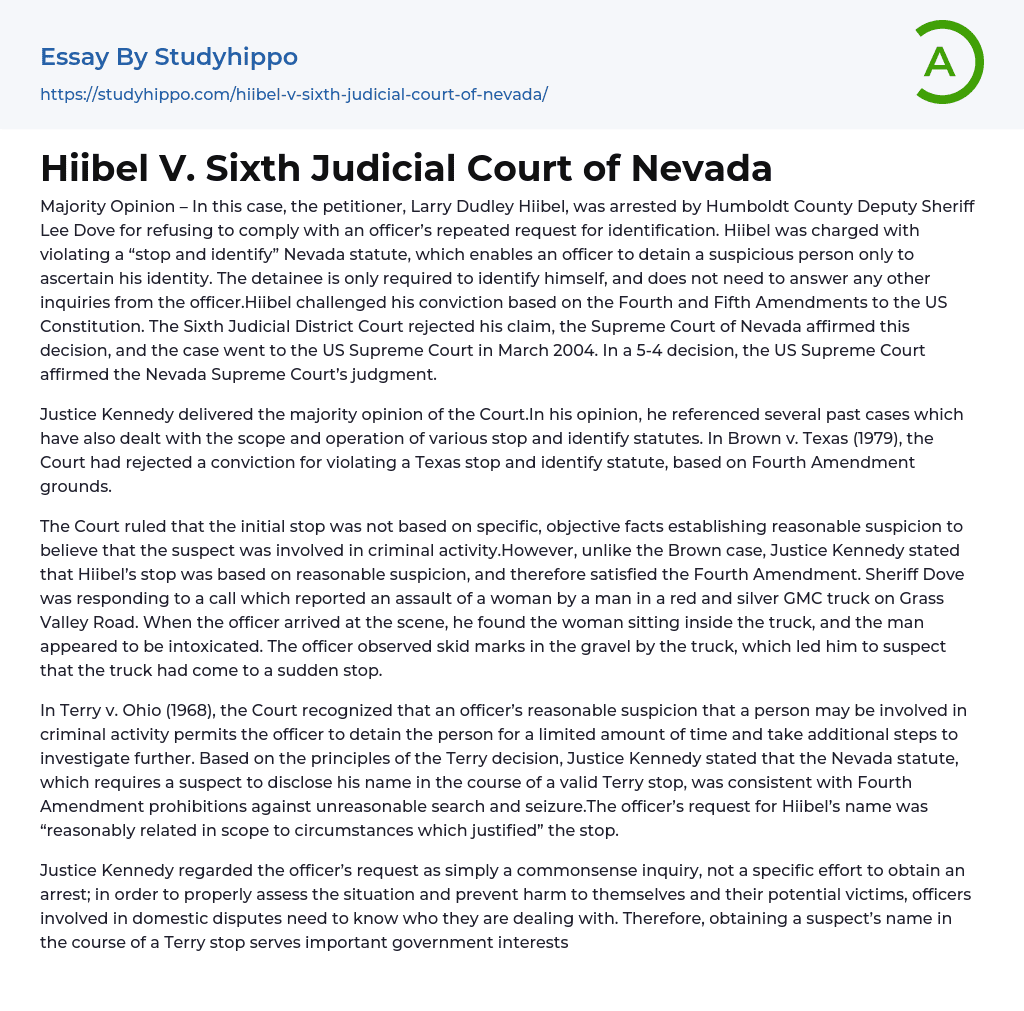Majority Opinion – In this case, the petitioner, Larry Dudley Hiibel, was arrested by Humboldt County Deputy Sheriff Lee Dove for refusing to comply with an officer’s repeated request for identification. Hiibel was charged with violating a “stop and identify” Nevada statute, which enables an officer to detain a suspicious person only to ascertain his identity. The detainee is only required to identify himself, and does not need to answer any other inquiries from the officer.Hiibel challenged his conviction based on the Fourth and Fifth Amendments to the US Constitution. The Sixth Judicial District Court rejected his claim, the Supreme Court of Nevada affirmed this decision, and the case went to the US Supreme Court in March 2004. In a 5-4 decision, the US Supreme Court affirmed the Nevada Supreme Court’s judgment.
Justice Kennedy deli
...vered the majority opinion of the Court.In his opinion, he referenced several past cases which have also dealt with the scope and operation of various stop and identify statutes. In Brown v. Texas (1979), the Court had rejected a conviction for violating a Texas stop and identify statute, based on Fourth Amendment grounds.
The Court ruled that the initial stop was not based on specific, objective facts establishing reasonable suspicion to believe that the suspect was involved in criminal activity.However, unlike the Brown case, Justice Kennedy stated that Hiibel’s stop was based on reasonable suspicion, and therefore satisfied the Fourth Amendment. Sheriff Dove was responding to a call which reported an assault of a woman by a man in a red and silver GMC truck on Grass Valley Road. When the officer arrived at the scene, he found the woman sittin
inside the truck, and the man appeared to be intoxicated. The officer observed skid marks in the gravel by the truck, which led him to suspect that the truck had come to a sudden stop.
In Terry v. Ohio (1968), the Court recognized that an officer’s reasonable suspicion that a person may be involved in criminal activity permits the officer to detain the person for a limited amount of time and take additional steps to investigate further. Based on the principles of the Terry decision, Justice Kennedy stated that the Nevada statute, which requires a suspect to disclose his name in the course of a valid Terry stop, was consistent with Fourth Amendment prohibitions against unreasonable search and seizure.The officer’s request for Hiibel’s name was “reasonably related in scope to circumstances which justified” the stop.
Justice Kennedy regarded the officer’s request as simply a commonsense inquiry, not a specific effort to obtain an arrest; in order to properly assess the situation and prevent harm to themselves and their potential victims, officers involved in domestic disputes need to know who they are dealing with. Therefore, obtaining a suspect’s name in the course of a Terry stop serves important government interests.Hiibel had also claimed that his conviction had violated the Fifth Amendment’s prohibition on self-incrimination. The Court rejected the Fifth Amendment challenge, stating that disclosure of Hiibel’s name presented no reasonable danger of incrimination.
Hiibel’s refusal to disclose his name was not based on any “articulated real and appreciable fear” that his name would incriminate him, or that it would “furnish a link in the chain of evidence needed to prosecute him. In the grand scheme of the
situation, disclosing a name is likely to be so insignificant that it would only incriminate the suspect in the most unusual circumstances. The Court did not agree that this case fell under the category of unusual circumstances. Therefore, upholding the Nevada Supreme Court’s judgment, it decided that Hiibel’s arrest did not violate the Fourth and Fifth Amendments.
- Supreme Court essays
- Supreme Court Of The United States essays
- Criminal Justice System essays
- Agreement essays
- Business Law essays
- Common Law essays
- Community Policing essays
- Constitution essays
- Consumer Protection essays
- Contract essays
- Contract Law essays
- Copyright Infringement essays
- Court essays
- Crime essays
- Criminal Law essays
- Employment Law essays
- Family Law essays
- Injustice essays
- Judge essays
- Jury essays
- Justice essays
- Lawsuit essays
- Lawyer essays
- Marijuana Legalization essays
- Ownership essays
- Police essays
- Property essays
- Protection essays
- Security essays
- Tort Law essays
- Treaty essays
- United States Constitution essays
- War on Drugs essays
- Animal Cruelty essays
- Charles Manson essays
- Crime Prevention essays
- Crime scene essays
- Criminal Justice essays
- Criminology essays
- Cyber Crime essays
- Damages essays
- Detention essays
- Distracted Driving essays
- Drug Trafficking essays
- Drunk Driving essays
- Forensic Science essays
- Gang essays
- Hate Crime essays
- Homicide essays
- Identity Theft essays




